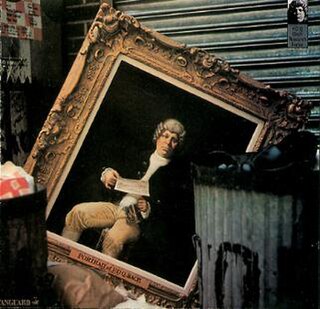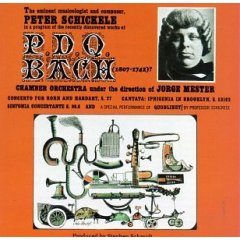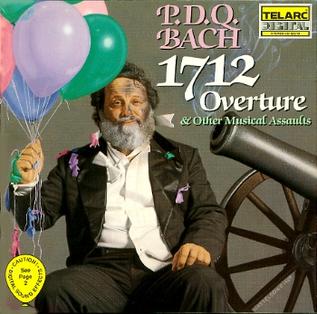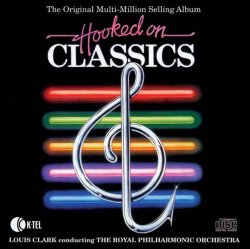The Abduction of Figaro is a comic opera in three acts, described as "A Simply Grand Opera by P. D. Q. Bach", by Peter Schickele. It is a parody of opera in general, and the title is a play on two operas by Wolfgang Amadeus Mozart: The Abduction from the Seraglio, K. 384, and The Marriage of Figaro, K. 492. Those two operas, as well as Così fan tutte and Don Giovanni, and Gilbert and Sullivan's The Pirates of Penzance are among the core inspirations for the piece. The Abduction of Figaro is numbered S. 384, 492 in Schickele's catalogue of works.

Eine kleine Nachtmusik, K. 525, is a 1787 composition for a chamber ensemble by Wolfgang Amadeus Mozart (1756–1791). The German title means "a little night music". The work is written for an ensemble of two violins, viola, cello and double bass, but is often performed by string orchestras. The serenade is one of Mozart's most famous works.

P. D. Q. Bach is a fictional composer created by the American composer and musical satirist Peter Schickele for a five-decade career performing the "discovered" works of the "last and the least" of the Bach family. Schickele's music combines parodies of musicological scholarship, the conventions of Baroque and Classical music, and slapstick comedy. The name "P. D. Q." is a parody of the three-part names given to some members of the Bach family that are commonly reduced to initials, such as C. P. E. for Carl Philipp Emanuel Bach; PDQ is an initialism for "pretty damned quick".
The Concerto for Horn and Hardart, S. 27, is a work of Peter Schickele composing under the pseudonym P. D. Q. Bach. The work is a parody of the classical double concerto but where one instrument, the hardart, uses different devices, such as plucked strings, blown whistles and popped balloons, to produce each note in its range. The name "hardart" and the name of the concerto is a play on the name of proprietors Horn & Hardart, who pioneered the North American use of the automat. Like the automat, the hardart had small windows in the front where the musician had to insert coins to remove implements needed to strike or otherwise play the devices that produced the notes. The composer Philip Glass, a classmate of Schickele's, helped build the actual instrument; Glass and the others tasked with building the hardart made it a transposing instrument without telling Schickele, who had to transpose at sight during the performance. As with other works that Schickele attributed to P. D. Q. Bach, "beneath the satire one finds very sound technique and invention in the music."
The Septet in E-flat major for clarinet, horn, bassoon, violin, viola, cello, and double bass, Op. 20, by Ludwig van Beethoven, was sketched out in 1799, completed, and first performed in 1800 and published in 1802. The score contains the notation: "Der Kaiserin Maria Theresia gewidmet". It was one of Beethoven’s most popular works during his lifetime, much to the composer's dismay. Several years later, Beethoven even wished the score to have been destroyed, saying: "That damn work! I wish it were burned!"

Report from Hoople: P. D. Q. Bach on the Air was released on Vanguard Records in 1967. It is set up as a radio broadcast of the music of P. D. Q. Bach with Professor Peter Schickele as the DJ.

The Ill-Conceived P. D. Q. Bach Anthology is a collection of works by Peter Schickele writing as P. D. Q. Bach originally recorded on the Telarc label by the composer.

Peter Schickele Presents an Evening with P. D. Q. Bach (1807–1742)? was the first concert of and the first release of the music of Peter Schickele under his comical pseudonym of P. D. Q. Bach by Vanguard Records. The chamber orchestra was conducted by Jorge Mester. The album consists of musical parodies with commentaries by the composer.

Music for an Awful Lot of Winds and Percussion was released in 1992 by Telarc Records. The album contains one piece by Professor Peter Schickele writing under his own name and several pieces by him as P. D. Q. Bach.

An Hysteric Return: P.D.Q. Bach at Carnegie Hall is live recording of a P. D. Q. Bach concert in Carnegie Hall and was released on Vanguard Records in 1966.

A Little Nightmare Music is an opera in "one irrevocable act" by Peter Schickele under the pseudonym he uses for parodies and comical works P. D. Q. Bach. The title of the work refers to the English translation of Mozart's famous Eine kleine Nachtmusik. The opera is described as being "based on a dream he had December 4, 1791, the night that Wolfgang Amadeus Mozart died and Antonio Salieri didn't." The opera was "newly exhumed" at Carnegie Hall on December 27, 1982. It was later recorded with the premiere cast and released on CD by Vanguard Records in 1983. The album also includes two other works by P. D. Q. Bach: an octet and a parody of Handel's Water Music and Music for the Royal Fireworks, Royal Firewater Musick.

1712 Overture and Other Musical Assaults is a classical music album released in 1989 by Telarc Records. The album contains works by P. D. Q. Bach, the alter ego of Professor Peter Schickele. It is scored for "really big orchestra and some not-quite so big ensembles, plus unique on-location introductions, spoken on the very historical spots where the actual history happened".

Oedipus Tex and Other Choral Calamities was released in 1990 by Telarc Records. The album contains works by Peter Schickele under his alter-ego of P. D. Q. Bach and won a 1990 Grammy Award for 'Best Comedy Performance'.

Two Pianos Are Better Than One was released in 1994 by Telarc Records. The album contains works by Peter Schickele, sometimes under the pseudonym P. D. Q. Bach, including the "Concerto for Two Pianos vs. Orchestra, and three other works that don't require even one piano."

The Short-Tempered Clavier and other dysfunctional works for keyboard was released in 1995 by Telarc Records. The album contains works by Peter Schickele, sometimes under his pseudonym of P. D. Q. Bach, including "works for various types of keyboards, including theatre organ, calliope, the ever popular piano, and the organ of the King Congregational Church of Fayray, North Dakota." The title is a parody of Johann Sebastian Bach's Well-Tempered Clavier.

The Wurst of P. D. Q. Bach is a collection of works by Peter Schickele under his comic pseudonym of P. D. Q. Bach originally recorded on the Vanguard Records label by the composer. It includes "lowlights" from four different Vanguard albums: Peter Schickele Presents an Evening with P. D. Q. Bach (1807–1742)?, An Hysteric Return: P.D.Q. Bach at Carnegie Hall, Report from Hoople: P. D. Q. Bach on the Air, and P. D. Q. Bach's half-act opera The Stoned Guest. Wurst is the German word for sausage, with the album cover photograph set in a sausage shop.

P.D.Q. Bach in Houston: We Have a Problem! is a live performance celebrating 40 years of P. D. Q. Bach. This performance features Professor Peter Schickele with Orchestra X conducted by Peter Jacoby. It includes never-before-recorded performances of "Trumpet Involuntary" movement of Iphigenia in Brooklyn, and also the rounds Odden und Enden.

P.D.Q. Bach & Peter Schickele: The Jekyll & Hyde Tour was released in 2007 by Telarc Records. The album contains works by Peter Schickele, sometimes as his alter-ego P.D.Q. Bach, including a collection of vocal works and a string quartet. It is a live recording of the "Jekyll & Hyde" Tour.

Hooked on Classics, produced by Jeff Jarratt and Don Reedman, is a multi-million selling album recorded by Louis Clark and the Royal Philharmonic Orchestra, published in 1981 by K-tel and distributed by RCA Records, part of the Hooked on Classics series.
















